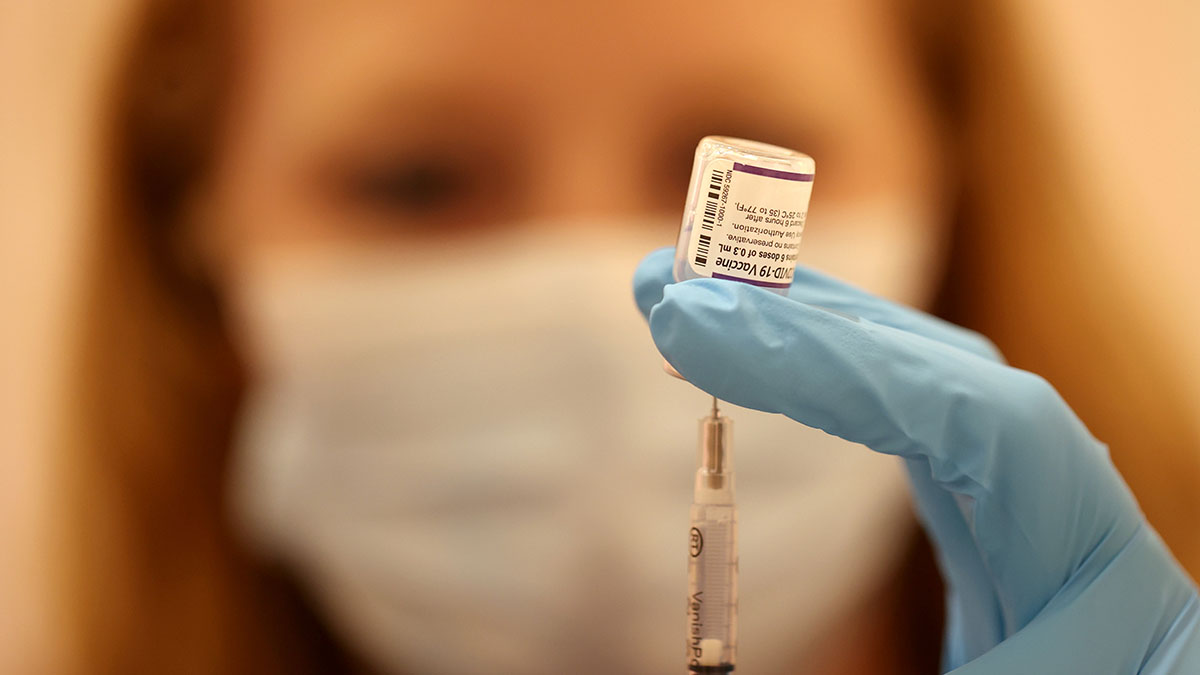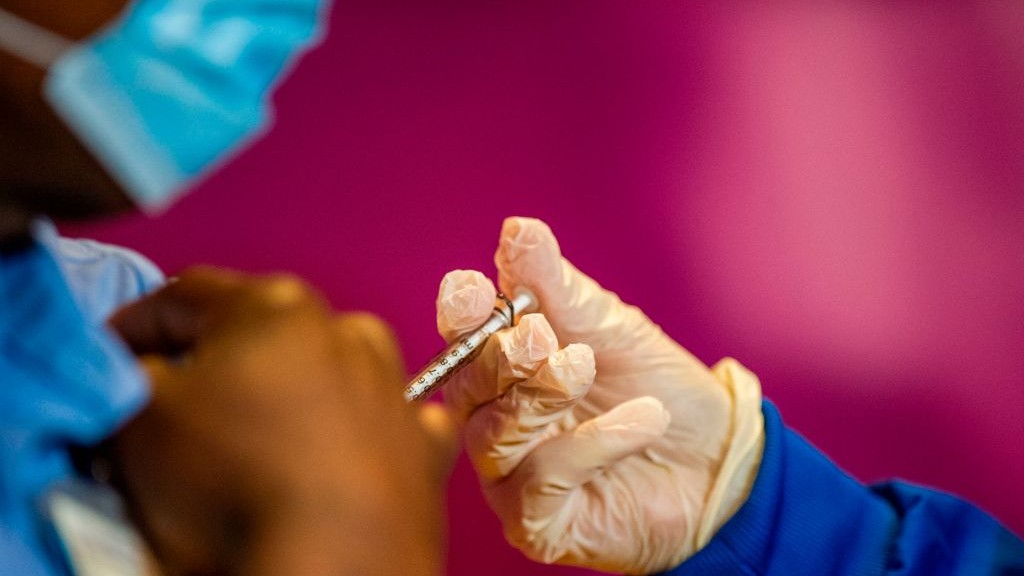The bivalent COVID booster shot is now available in the Chicago area for anyone who has already had a primary series and is over the age of 12. NBC 5’s Lauren Petty reports.
While new omicron-specific booster shots are underway across the Chicago area, health experts say there's a concerning vaccination metric that many may not have been watching.
Plus, how long are you contagious with COVID and how are symptoms changing?
Stream NBC 5 for free, 24/7, wherever you are.
Here's what you need to know about the coronavirus pandemic across Illinois today:
COVID-19 Symptoms Have Changed Over Time. Here Are the Latest Signs of Infection to Look Out For
As COVID-19 mutates, composing itself to become highly-transmittable through novel strains, the virus is also finding new ways to present itself in patients.
It's important to note what COVID-19 symptoms may appears as, considering the latest BA.5 variant remains as the country's dominant driver of infections, and that the pandemic is facing its third winter — a season that has been typically marked by a surge in cases.
Read more here.
Are You Still Contagious With COVID After 5 Days? Here's What We Know
As COVID's incubation period changes, what does that mean for isolation time and how long you are contagious?
During a Facebook Live last month, Chicago Department of Public Health Commissioner Dr. Allison Arwady reported that recent studies have shown the incubation period for COVID has dropped to three days with recent variants.
Feeling out of the loop? We'll catch you up on the news you need to know with the Chicago Catch-Up newsletter.
Read more here.
Coronavirus in Illinois: Nearly 20K New Cases, 64 Deaths Reported in Last Week
Illinois health officials reported 19,933 new COVID-19 cases over the past week, along with 64 additional deaths, marking a decrease in cases from a week prior, as 28 counties within the state remain at a "high" community level for COVID-19.
Read more here.
Have COVID Symptoms Changed Over Time? What to Know About the BA.5 Variant
With both the BA.5 omicron variant remaining the dominant variant of COVID-19 in the US and colder weather on the horizon, many are wondering what symptoms may appear as the COVID-19 pandemic begins to enter its third winter.
As cases remain steady in the US, the symptoms of COVID-19 have slightly evolved over time, with many curious if there are specific symptoms to watch out for in the dominant BA.5 variant that differ from previous dominant strains of COVID-19.
Read more here.
How Long Are You Contagious With COVID? The Incubation Period Has Changed, Top Doc Says
COVID's incubation period has changed with the extra-contagious BA.4 and BA.5 omicron subvariants, Chicago's top doctor said, but what does that mean for how long you are contagious?
During a Facebook Live last month, Chicago Department of Public Health Commissioner Dr. Allison Arwady reported that recent studies have shown the incubation period for COVID has dropped to three days with recent variants.
Read more here.
Is a Rash a Sign of COVID? Here's What to Know About Symptoms
According to the latest COVID update from the Centers for Disease Control and Prevention, the BA.5 lineage of the omicron variant is now the most prevalent strain of the virus in the U.S., and that variant comes with a shift in symptoms. But what if you have a symptom that isn't among the most common?
Read more here.
Beyond COVID: Hundreds of Area Schools Post Low Vaccination Rates — Or None at All
In the fog of COVID, it’s easy to forget all the other contagious diseases we try to protect ourselves from, through routine vaccinations for measles, mumps, whooping cough, polio and more.
Pediatrician Kristin Kan at Lurie Children’s Hospital says it’s all the more important, now that we are learning to live with COVID-19, that kids get back on track to stay up-to-date on all of these other shots.
NBC5 Investigates discovered it’s no easy task for parents to find out whether their children’s classrooms have sufficient numbers of students immunized from serious contagious diseases – despite state law that says these numbers should be publicly available. Search our table at the link below to find out the most recently-reported vaccination rates for your school.
Read more here.
BA.5 Subvariant Continues to Dominate, but BA.4.6 Starts to Gain Foothold
As new omicron-specific COVID vaccines enter the market, another sublineage of that virus is starting to gain a foothold in the United States.
According to the latest data from the Centers for Disease Control and Prevention, the BA.4.6 subvariant continued to gain steam this week, now making up an estimated 8.4% of COVID cases.
That is up slightly from a week ago, when the subvariant was responsible for an estimated 7.6% of cases in the U.S.
Read more here.
Can You Mix and Match Your COVID Booster Shot?
For those who are planning to get a COVID booster shot, will they need to get the same vaccine as their primary series or can they mix and match?
The answer depends.
Read more here.
If You've Already Had a Booster Shot, Can You Get the New COVID Vaccine?
The new COVID vaccines designed to specifically target the omicron variant and its highly contagious subvariants come with plenty of questions, including some from those wondering if they can still get the updated booster even if they already had a booster vaccine?
The answer is yes, as long as your last booster dose was at least two months ago.
Read more here.
Where Can You Find COVID Booster Shots in the Chicago and Who's Eligible? Top Doc Explains

New COVID Boosters Are Now Available in the Chicago Area. Here's Who Experts Say Should Get the Shot
The long-awaited COVID booster shots made to target the highly contagious BA.4 and BA.5 omicron subvariants have arrived at pharmacies in the Chicago area, with more doses on the way headed to doctors offices and health clinics across Chicago and Illinois.
According to a Friday announcement from the Illinois Department of Public Health, the state expects to receive 580,000 doses of the new booster. And that's in addition to the 150,000 doses Chicago is primed to receive, IDPH said.
Here's who is eligible to get them.
Where You Can Find New COVID Booster Shots From Moderna, Pfizer in Chicago Area
Chicago-area pharmacies are among the first offering up doses of the new "bivalent" COVID booster shots, with more availability expected to open up this week.
CVS announced Friday, one day after the Centers for Disease Control and Prevention issued its recommendation for the new vaccine, that some locations were already offering up doses of both Moderna and Pfizer's revamped booster shots. Appointments were already opened up and several continue to be available for this week.
Walgreens locations are also now booking appointments for the newly approved COVID booster shots that specifically target the highly contagious BA.4 and BA.5 omicron subvariants, the pharmacy said in a release Friday.
What Is Paxlovid Mouth and Why Do Some Get It? Chicago's Top Doc Explains
Paxlovid has been in headlines recently as the anti-viral COVID treatment has been used in some high-profile cases, including President Joe Biden, and while the drug has been associated with rare cases of what's known as "COVID rebound," some who received it have also noted another unusual side effect being referred to as "Paxlovid mouth."
According to Rush University Medical Center, "Paxlovid mouth" is often used to refer to a metallic or bitter taste in the mouth shortly after taking the drug.
Chicago's Top Doctor Reveals Which COVID Symptoms She Experienced
Chicago's top doctor became the latest high-profile COVID case to hit the Chicago area last week and on Tuesday she described what her experience was like.
Having contracted the virus for the first time last week, Chicago Department of Public Health Commissioner Dr. Allison Arwady said she believed she got sick during a family vacation.
Upon her return, she immediately began testing - and then last Tuesday, the symptoms began.
Read more here.
What's Behind That Sore Throat? How to Know if It's COVID, Allergies, Strep or More
Have a sore throat but aren't sure what's causing it?
There are several possibilities that could be behind the symptom, with things like COVID, allergies and strep throat all leading to similar symptoms.
Currently, allergy season is peaking in the Chicago area, bringing a rash of cold-like symptoms, with the peak expected to continue until the end of September for those particularly sensitive to ragweed.
Read more here.
What Makes New COVID Boosters Different From Previous Shots? Experts Explain
The Food and Drug Administration on Wednesday authorized new COVID booster shots known as a "bivalent" vaccines, what does that mean and how exactly are they different from previous COVID vaccines administered earlier in the pandemic?
Until now, COVID-19 vaccines have targeted the original coronavirus strain, even as wildly different mutants emerged. The new U.S. boosters are combination, or “bivalent,” shots. They contain half that original vaccine recipe and half protection against the newest omicron versions, called BA.4 and BA.5, that are considered the most contagious yet.
Read more here.



